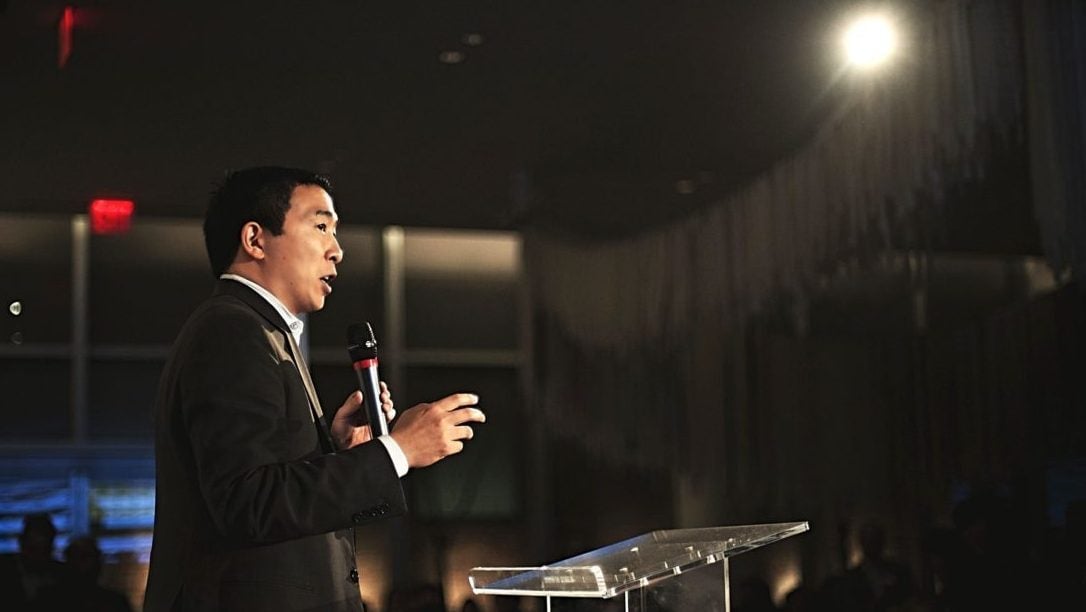Andrew Yang is running for president to save Americans from machines
The race for the 2020 US presidential campaign is already underway, and one of the election’s most unconventional candidates is Andrew Yang, a New York entrepreneur. His biggest worry? Machines.


The race for the 2020 US presidential campaign is already underway, and one of the election’s most unconventional candidates is Andrew Yang, a New York entrepreneur. His biggest worry? Machines.
Yang explained the basics of his campaign platform during a March 26 Ask Me Anything session on Reddit. Intelligent robots and software are coming for Americans, and our best hope lies in a universal basic income and free health care for all.
First among Yang’s concerns is the potential for automation to take Americans’ jobs. Technology will claim a massive swath of jobs over the next decade, Yang argues, affecting everyone from truck drivers to retail workers and insurance agents. (Not all experts agree that this will happen.) Automation-induced joblessness could ignite widespread social unrest.
Secondly, Yang warned artificial intelligence (AI) is “one of the few real species/civilization-wide threats we face, which is AI development that runs amok.” He added that one AI expert had compared the weaponized algorithms to “nuclear weapons, but worse,” since off-the-shelf AI could be deployed by poor countries and rogue actors.
Yang’s perspectives on automation and AI reflect his disenchantment with the fruits of capitalism and technology in recent years. The lawyer-turned-businessman ran startups, one of which was acquired by Kaplan in 2009, before starting Venture for America—a fellowship program that helps recent graduates create new companies, and new jobs, in cities outside the existing tech hubs.
As a politician, Yang has aligned himself with the populist moment. The policies behind his two-pronged platform—a universal basic income (or “Freedom Dividend“) and universal healthcare (“Medicare for all”)—are already muscling into the mainstream both on the left and, increasingly, on the right. The majority of Democrats (65%) already support a UBI, along with 28% of Republicans, according to a 2018 Gallup poll. (The country as a whole is split almost evenly on the issue.) On health care, the majority of Democrats now support a single-payer system, while 12% of Republicans agree—but the Republican figure has been inching up consistently in the last few years, reports Pew.
To pay for the effort, Yang would levy a value-added tax that returns $1,000 per month to every adult US citizen regardless of work status or other factors. The idea, Yang says, is to give all Americans enough money to pay for their essentials, education, time with family, and even enough to start a business. “I’m a capitalist,” he told The New York Times (paywall), “and I believe that universal basic income is necessary for capitalism to continue.”
Yang encountered plenty of fans during his Reddit appearance. His conversation rarely veered beyond wonky policy questions and the dangers of AI. To be competitive as an insurgent presidential candidate, however, Yang will need to tap into the broad, mass outrage that fueled the rise Bernie Sanders and Donald Trump.
So far, he’s styling himself in their image. Yang strikes an appropriately populist note in his new book, The War on Normal People, and his motto is “Humanity First.” His simple website, decked out in patriotic reds and blues, rails against the status quo while raising proposals that, not long ago, would have been seen as radical.
Yet Yang’s campaign still faces the same challenges that confront his signature UBI proposal: “Funding, even for a major proposal like this, isn’t that difficult,” wrote Yang on Reddit about the $2 trillion measure. “Convincing people is though.” So far, his campaign has raised about $130,000 (paywall) since last November. He plans to raise “millions” more from the tech community, and prominent alumni at Facebook, Google, and other tech giants have backed his campaign. There’s no doubt that he’s a long shot—but as Donald Trump proved, political outsiders sometimes have a chance.